How To Start a Power Washing Business: Step-By-Step Guide
There’s a sweet satisfaction you get when you blast a powerful stream of water at a dirty patio or faded fence and watch it turn from green to pristine. It’s not just cleaning. It’s a transformation. And if you love that feeling of satisfaction, turning pressure washing into a business can be your ticket to success.
People need their stuff cleaned. Driveways, houses, decks, businesses—it all gets dirty, and most folks don’t have the time or gear to tackle it. That’s where you come in.
This guide breaks down everything you need to know to get your pressure washing business up and running, from what equipment to buy to how to get paying customers. Let’s get to work.
So You’re Thinking About Starting a Pressure Washing Business…
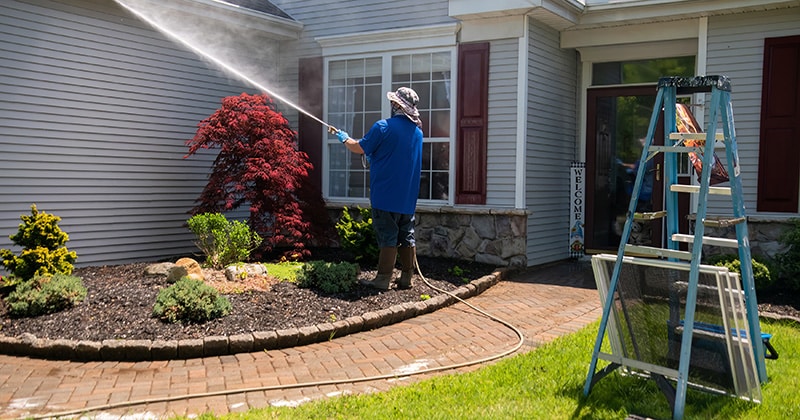
You’re eyeing that pressure washer. You want to be your own boss and build a business, and pressure washing offers a clear path. It’s a hands-on trade with strong demand, giving you the chance to chart your own course.
Advantages of Starting a Pressure Washing Business
There are good reasons why this business model works well for many:
- Low startup costs: Compared to many other ventures, you don’t need a massive loan to start a pressure washing business. Your main expenses are equipment, supplies, and a vehicle.
- Consistent demand: Dirt and grime are constants. Homes, commercial properties, sidewalks, decks, and fences all need regular cleaning. There is a steady demand for professional pressure washing services, and plenty of people are happy to pay someone else to do the work.
- Immediate results: There’s nothing like seeing a filthy surface come clean. It’s rewarding work, and it’s fun. The transformation you provide is immediate and obvious. Satisfied customers mean repeat business and valuable word-of-mouth referrals.
- Flexible schedule: You set your own hours and control your workload.
- Scalability: You can start as a solo operator with a small power washer and expand at your own pace. As your business grows, you can invest in more commercial pressure washing equipment, add more crews, and take on larger projects.
Understand Your Market and Competition
Before you buy your first nozzle, you need to understand the playing field. Conducting market research helps you find your niche.
- Why it matters: Research shows you where the demand is. It reveals if your area needs more pressure washers or if it’s already saturated. You learn what services are popular and what customers expect.
- Checking out the competition: Take the time to scout your local area. Who else is doing pressure washing? What are they charging? Are they busy? What do their websites look like? Read their reviews.
- Spotting opportunities: By knowing the market, you can identify gaps. Maybe no one in your area offers pressure washing for commercial buildings or schoolyards. This is your chance to offer something better or different.
Key Considerations for the Pressure Washing Industry
Every business has its challenges. Addressing critical points before they become serious issues helps you build a strong foundation. Here are a few things about the pressure washing business to keep in mind:
- Physical demands: The work involves lifting, moving equipment, and being on your feet for extended periods. It requires physical stamina.
- Weather-dependent: Rain, high winds, or freezing temperatures can shut you down. You’ll need to factor those challenges into your schedule and cash flow.
- Seasonal swings: In many areas, pressure washing is busiest in warmer months. Think about off-season services or saving up during peak times.
- Equipment maintenance: Your pressure washing business relies on its equipment. Regular maintenance, cleaning, and occasional repairs add to your operational costs.
- Managing expectations: People want their properties to sparkle, and sometimes their expectations are unrealistic. While results are often dramatic, some stains or damage might not be removable. Clear communication with clients about what can and can’t be done is an essential part of the job.
- Safety first: Water and electricity don’t mix. High-pressure water can cause damage or injury if you’re not careful. Proper training and insurance for your pressure washing business are vital.
RELATED ARTICLE — How Much Does It Cost to Start a Business? A Comprehensive Guide
How Much Does It Cost to Start a Pressure Washing Business?
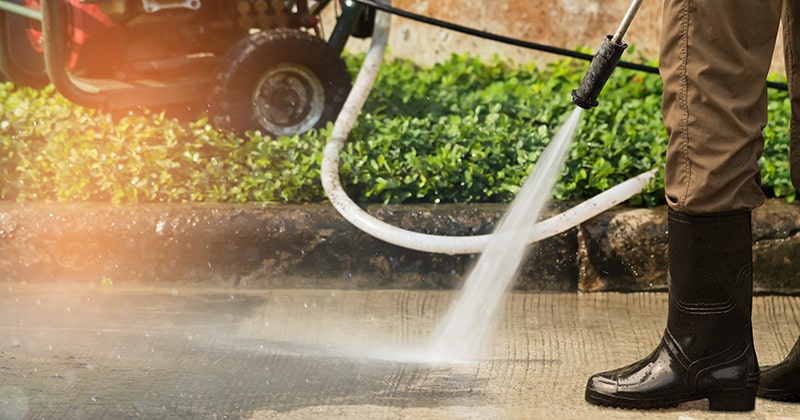
The good news is you can launch your pressure washing business without breaking the bank. Understanding the essentials helps you plan your budget. You can get started for a few thousand dollars and scale up as your business grows.
The cost to start a pressure washing business generally falls into a few key categories:
- Equipment and supplies: This is your primary investment. It includes the pressure washer itself, hoses, nozzles, surface cleaners, cleaning detergents, and essential safety gear. The quality and type of equipment you choose are major factors in your startup costs.
- Transportation: You’ll need a reliable way to get your gear to jobsites. This might be your existing truck or van, or you might consider a small utility trailer for better organization as you expand.
- Legal and regulatory: This covers the necessary paperwork, like getting a business license and any permits required by your city or county for legal operation.
- Insurance: Protecting your business is critical. Insurance for your pressure washing business, particularly general liability, is a must to cover potential accidents or property damage. It’s an ongoing operational cost that begins at startup.
- Marketing and branding: To get customers, you need to spread the word. This can include setting up a basic online and social media presence and local advertising.
8 Easy Steps to Start Your Pressure Washing Business
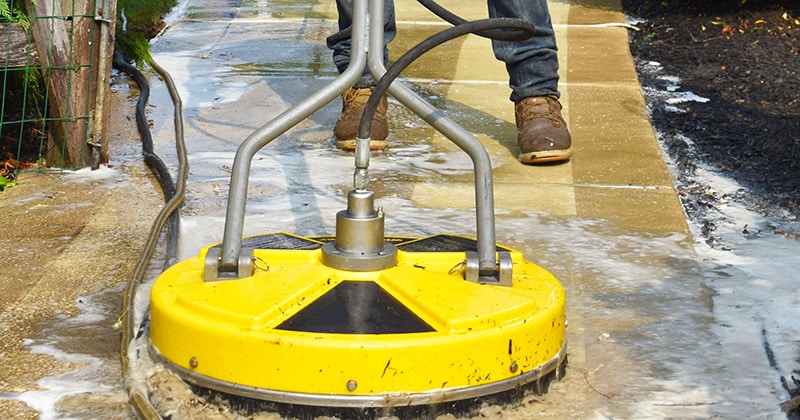
You’ve got the vision. You understand the general costs. Now you’re ready to get to work. Building your own pressure washing business is a systematic process. By breaking it down into clear, actionable steps, you set yourself up for success. Follow this guide to turn your ambition into reality:
1. Map Out Your Business Plan
A simple business plan is your roadmap. It helps you focus and makes it easier to track your progress. It doesn’t need to be a formal 50-page document, but it should touch on these points:
- Services: Residential? Commercial? Both? Will you specialize or generalize?
- Customers: Who are your ideal clients?
- Goals: How much do you want to make in the first year? How many jobs per week?
FROM ONE OF OUR PARTNERS — How To Write a Business Plan: A Step-By-Step Guide
2. Choose Your Business Structure
Deciding on your legal structure impacts taxes, liability, and paperwork. Research what’s best for your situation. A sole proprietorship is simple to set up, but you’re personally liable. A limited liability company (LLC) protects your personal assets from business debt and legal claims. It’s a bit more complex to set up and maintain, but it offers better protection.
3. Handle Licenses and Permits
Don’t skip the legal stuff. Most cities and counties require a general business license. If you’re a sole proprietor but want to operate under a business name like “Sparkle Stream Washing,” you’ll need to register a DBA (doing business as) name. Check with your local municipal office or county clerk’s office. And depending on your location, there might be rules about water runoff, wastewater disposal, or chemical use.
4. Get Business Insurance
Insurance is non-negotiable. Accidents happen, even to the best operators. Insurance for your pressure washing business protects your livelihood.
- General liability insurance: This is your core protection. It covers accidental damage to client property and third-party bodily injury.
- Commercial auto insurance: If you use your personal vehicle for business, your standard policy might not cover business-related incidents. A commercial policy provides the right coverage.
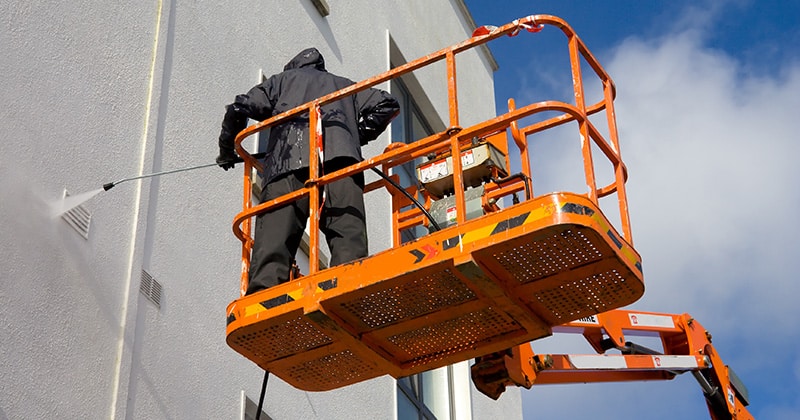
5. Buy Your Equipment and Supplies
Your gear is where your plan comes to life. Balance quality with your budget. Good equipment lasts longer and performs better, leading to more efficient work and happier customers.
- Pressure washer: An outstanding pressure washer is your most important investment. While you can start with a small power washer, for a serious pressure washing business, you’ll want to invest in the right commercial pressure washing equipment.
- Hoses: Go for durable, non-marking high-pressure hoses at least 50–100 feet long and a good garden hose for water supply.
- Nozzles: You’ll need various tips for different tasks and surfaces.
- Surface cleaner: A surface cleaner with wheels and high-powered jets is a game-changer for cleaning large flat areas like driveways, patios, and sidewalks.
- Detergents: Stock up on professional-grade cleaning solutions such as concrete cleaners and wood brighteners suitable for different surfaces. Always use environmentally safe options when you can.
6. Set Your Rates
Understanding how to price pressure washing jobs is crucial for profitability and competitiveness. You must cover your costs and make a profit. You’ve also got to play in the same ballpark as your competition.
- Research local rates. Find out what other local pressure washing companies charge for similar services. Don’t undercut. Aim for fair value.
- Calculate your costs. Figure out your hourly operating costs. How much do you spend on fuel and detergent? Don’t forget to include your overhead—what you spend on equipment wear, marketing, and insurance.
- Decide on a pricing model. Per job or by the hour? Charging per job is often preferred by residential customers because it’s predictable. Base your estimate on square footage, difficulty, and time. Charging by the hour is sometimes better for complex and less defined projects or commercial work where the scope might evolve.
- Value your time. Don’t underprice your work. Remember, you’re not only charging for the time on site but also for your expertise, equipment investment, and overhead.
RELATED ARTICLE — Pressure Washing Pricing Guide: A Complete Overview
7. Set Up Your Banking and Accounting
Separate your personal and business finances from day one. This makes tax time much simpler and gives you a clear picture of your business’s health.
- Business bank account: Open a dedicated checking account for all business income and expenses.
- Accounting software: Use simple accounting software to track income, expenses, and mileage. It’ll make tax preparation easier.
- Payment processing: Decide how you’ll accept payments—cash, checks, credit cards, and/or digital payments? Integrating with innovative tools like Joist gives you more options. Joist can help you create professional estimates and transform them into invoices, as well as manage payments.
8. Establish Your Marketing Channels
Once you’re set up, you need to find customers. Let your community know there’s a new business in town.
- Online presence: A simple, professional website is your digital storefront. Set up a free Google Business Profile for local search visibility. Look into Google Ads. Check out digital strategies for small home services businesses.
- Social media: Platforms like Facebook and Instagram are great for showing before-and-after photos of impressive pressure washing results. You can manage campaigns with Meta Business Suite.
- Local networking: Talk to other home service professionals like painters, landscapers, and cleaning companies who might refer clients to you. Ask them how they price their jobs to get your own pricing ideas. Build a network of trusted services in your community.
- Word of mouth: Encourage satisfied customers to leave reviews and refer you. Offer a referral incentive.
FROM ONE OF OUR PARTNERS — Digital Strategies for Small Home Services Businesses
7 Tips to Maximize Your Small Business
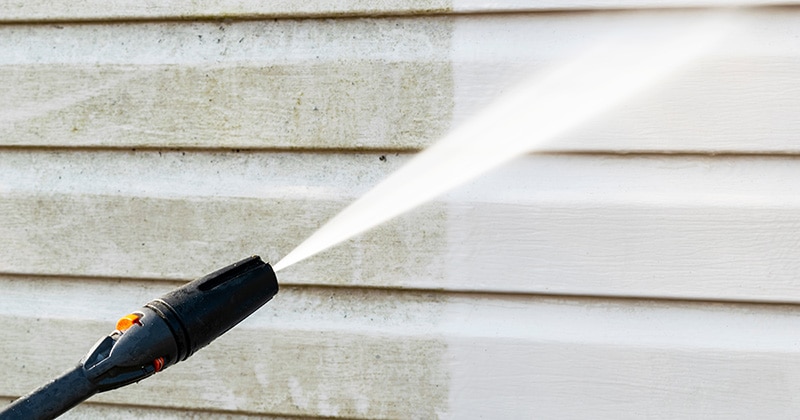
Getting your pressure washing business off the ground is one thing. Making it prosper is another. Once you’re up and running, you need strategies to keep growing and become the go-to pressure washing business in your community. These tips can help you work smarter, not harder:
1. Know Your Best Customers (and Find More Like Them)
You already identified a target audience in your business plan. Now it’s time to refine it. Who are your ideal clients? Are they busy professionals? Families? Seniors? Focus your marketing efforts on reaching more people like them.
2. Own a Niche
Don’t just clean everything. Becoming the go-to expert for a specific service or client type lets you charge premium rates and reduces competition. Find your specialty and dominate it.
3. Use Software to Work Smarter
Stop wasting time on paperwork. There are tons of apps and software designed for home service businesses. Use tools that help you:
- Create professional estimates and invoices fast
- Schedule jobs and manage your crew’s routes
- Track payments and see what’s due
- Manage customer information in one place
Platforms like Joist are built to help contractors handle administrative tasks so you can focus on doing what you do best. Plus, Joist syncs with QuickBooks Online accounting software to further lighten the load.
4. Deliver an Excellent Customer Experience
In a service business, your reputation is everything. Show up on time. Communicate clearly. Follow up after the job to make sure your customer is satisfied. A happy customer isn’t just a one-time sale; they are a walking advertisement for your business. Great service leads to positive reviews and glowing word-of-mouth referrals.
5. Expand Your Reach
Once you find your rhythm, look for new opportunities:
- Commercial contracts: Businesses like restaurants, gas stations, or apartment complexes often need recurring pressure washing services. These contracts provide steady, predictable income.
- New services: Could you add services like window or gutter cleaning? Think outside the box. You can use a pressure washer to clean a swimming pool or wash a hot tub. Make local businesses happy by blasting graffiti off their walls.
6. Leverage Online Reviews
Your past work is your best advertisement. Encourage satisfied customers to leave online reviews. Reviews help you stand out and show you are a trusted member of the community.
You can even use software that integrates collecting reviews into your existing workflow, so it’s super easy.
7. Never Stop Learning and Improving
The industry, tools, and best practices evolve. Stay sharp by learning new techniques. Find out what eco-friendly detergents can do the job. Keep an eye on the latest commercial pressure washing equipment. The more you know, the more valuable your service will be and the more your clients will be willing to pay.
Win more clients on the spot with quick estimates
Create and share estimates in just minutes with our easy-to-use mobile estimating tool. Packed with powerful features built for contractors, including deposits, markups, contracts, and photos.